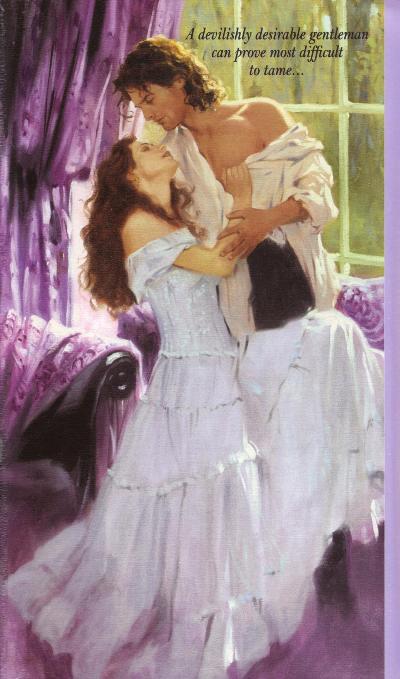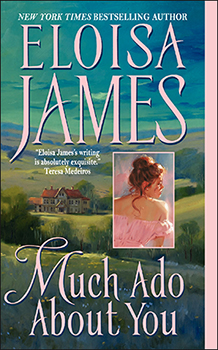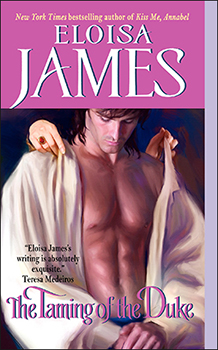
Bookcode: duke
Essex Sisters Series Crossword Puzzle
Essex Sisters Collectible Card
The covers of each of Eloisa’s series are grouped together into gorgeous collectible cards. In addition to this card for the Essex Sisters, there is a card for Eloisa’s Fairy Tales, Desperate Duchesses (the Original Six), and the Duchess Quartet.
Note: Collectible cards are no longer available.
Duke: Romantic Times nomination
Romantic Times BOOKClub nominated The Taming of the Duke for “Historical Romance of the Year”!
Duke: USA Today bestseller
#18 on USA Today bestseller list.
Duke: NYT bestseller
#17 on the New York Times extended list.
Duke: PW bestseller
#10 on Publishers Weekly bestseller list.
Duke: RITA finalist
RITA (romance’s top prize) Finalist for Best Short Historical of 2006.
Inside The Taming of the Duke
- Cristobel’s songs come from a wonderful collection of seductive verse: Bawdy Verse: A Pleasant Collection, edited by E. J. Burford and published by Penguin in 1982. The songs in his collection date from around 1400-1786; I judged some too wild for our delicate contemporary ears
- Josie distorts Shakespeare on page 113, as Annabel points out. She’s quoting from Twelfth Night. As a Shakespeare professor, I often teach those lines in context, but I actually first encountered them in the delicious novel by Georgette Heyer, Venetia. If you haven’t read Venetia, run to the nearest store! It’s her sexiest, to my mind.
- In the 1800s, alcoholism wasn’t seen as a medical issue, an illness, but as a moral failing. I was lucky enough to have several friends who are alcoholics, and talked to me frankly about the process of drying out. For a sense of the historical attitude toward drink, I found Jack London’s John Barleycorn to offer a brilliant picture of an alcoholic. The name comes from an ancient English folksong about the drinks that come from distilling barley: beer and whiskey.
 Gillian Pythian-Adams first appeared in Much Ado About You, as the fiancée of Lord Maitland. Maitland was stolen away by Imogen, but Gillian gathered so many fans in her brief appearance in that book that I had to bring her back.
Gillian Pythian-Adams first appeared in Much Ado About You, as the fiancée of Lord Maitland. Maitland was stolen away by Imogen, but Gillian gathered so many fans in her brief appearance in that book that I had to bring her back.- Griselda’s opinions about French plays come to my book by way of Oscar Wilde who is, hands down, one of the funniest chroniclers of desultory conversation among the aristocracy that I have ever read. (“The Merrie Ballad of Nashe His Dildo” is a good example).
 Once upon a time, Griselda had a dog named Milo, a small brown dog who eats and eats. I too have a dog named Milo. Milo is a long-haired Chihuahua. Did you know that some small breeds experience unusual growth? Milo is about triple your normal Chihuahua, and what he loves best in the world is food. Although he does have a hearty affection for us. Here’s a picture of Milo swimming in Elba, Italy.
Once upon a time, Griselda had a dog named Milo, a small brown dog who eats and eats. I too have a dog named Milo. Milo is a long-haired Chihuahua. Did you know that some small breeds experience unusual growth? Milo is about triple your normal Chihuahua, and what he loves best in the world is food. Although he does have a hearty affection for us. Here’s a picture of Milo swimming in Elba, Italy.- On page 101, Rafe says that he received a remarkably tedious letter from an old school friend Yates, who is obsessed with a performance of Lovers’ Vow. This is a tribute to Jane Austen’s Mansfield Park, where a character named Yates is obsessed with Lovers’ Vows.
- The play that Gillian chooses to direct is George Etheridge’s Man of Mode, a hilarious Restoration play. I once edited it for a scholarly edition, so I’m very fond of it. I hope you get a sense of how firmly Etheridge’s rake Dorimant is a model for all the Regency Rakes we create nowadays.
- And finally, some small snippets in this novel came from reading issues of La Belle Assemblee dated 1810. That worthy journal contained a column detailing “Remarkable Occurrences.” The cask of wine that gave way under the weight of those standing on top of it, and the dreadful accident in the town of Biggleswade, recounted by Loretta, are two such occurrences.
With the Help of Jane Austen…
Enjoy this tidbit from when Eloisa was writing The Taming of the Duke.
The book I’m writing at the moment (as yet, untitled) circles around the production of a play — and yes, for those enthusiasts out there, Miss Gillian Pythian-Adams is the producer. The obvious progenitor of this kind of novel is Jane Austen’s Mansfield Park, in which a houseparty tries to put on a production of Love’s Vow. They are halted at the last moment by the arrival back home of a rather dour father figure who tosses everyone out of the party. You’ll be happy to know that my characters are rather more successful; I generally dispense with Puritan-esque father figures early on as they dampen the plot.
At any rate, I wanted to add a small acknowledgement of Miss Austen’s brilliant book, so at one point Lady Griselda and Rafe have an argument about the propriety of putting on a play, especially one to be directed by Gillian Pythian-Adams.
“If Miss Pythian-Adams has accepted your invitation,” Griselda said, keeping a firm grasp on her toast, “we shall need to arrange a house party in order to cover over the oddness of it all.”
“It’s all a matter of semantics,” Rafe said. “Theatrical parties are all the rage. An old friend of mine from school, Yates, is quite obsessed with them and wrote me a remarkably tedious letter about some performance of Love’s Vow.”
And there we are: Yates (who appears in Sense and Sensibility as a prime mover of the play) turns out to be one of Rafe’s school friends. And Rafe would definitely have found Yates to be a remarkably tedious person, old friend or not.
Originally published August 2005.




